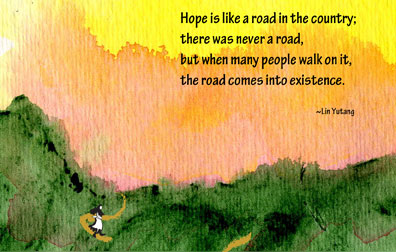I have been exploring other people's notions of hope. Two quotes have been dancing in my mind the last few days. Christopher Reeve said, " Once you choose hope, anything's possible." Marion Zimmer Bradley wrote, " The road that is built in hope is more pleasant to the traveler than the road built in despair, even though they both lead to the same destination."
After actor Christopher Reeve became quadriplegic in 1995, he used his fame to advocate for research that would lead to a cure for paralysis. I am ashamed to admit I was disappointed with his choice. I thought he might champion physical and social accessibility for people with disabilities. (At that point in my life, I had begun to use a cane to walk short distances and a scooter to travel longer ones.) I thought his determination to walk again was an unrealistic waste of time. Now I see it differently. He was practicing choosing Hope.

Until recently I thought I didn't “do hope." My interaction with Julie Neraas, author of Apprenticed to Hope has transformed my thinking. She has helped me understand hope as (among other things) a belief that, in the end, things will be all right. I recognize that moments of that belief have carried me forward through my messy life. Reaching for those moments is the underlying purpose of my insistence on practicing life as a creative process. Surprise: I do hope.
I don't, however, do it well. Zimmer Bradley is pointing out that our future is unknowable and beyond our control. Our road will lead where our road leads. As we travel we can choose our attitude: we can choose hope or despair. I spend way too much time in the unpleasantness of despair.
Can I get better at choosing Hope?
Any parent with school-aged children knows that spring is concert season. In the last week, I have been to two middle school music concerts. They have reminded me how we go about learning and improving skills.
- We observe as other people demonstrate. Reading about hope, hearing other people talk about their hope and watching as others live in hope gives me that opportunity.
- We break the whole into small, more manageable, parts. What are the pieces of choosing Hope?
- Choose to choose. When I was a young psychology student, I tripped over the idea that I could choose my emotions. My feelings seem to jump out at me randomly from dark corners. (Yes, part of the problem was that I was shoving my feelings into dark corners.) I couldn't imagine having any control over my emotions. Then I discovered Rational Emotive Therapy and the idea that what I was thinking gave rise to what I felt. Even though my first thought was an unconsidered reaction, I realized I could choose a different thought to replace it. Despite my instinct toward despair, I can practice thinking toward hope.
- Look for the good. Speaking of middle school music programs, one of my junior high choir directors told us "the pony joke," with the punchline "with all this manure, there must be a pony in here somewhere." (If you haven't heard the joke, you can find it here.) I've returned to the story many times since. Finding the good in every situation—while admitting what could be the horrible realities of it—can help me choose hope.
- Choose as an individual. I was a viola player between the ages of eight and 30. I was lucky enough to want to play and, though I'm sure my parents reminded me to practice, I don't remember putting up much resistance. I was playing for the sake of playing, because I enjoyed it and not to get anywhere in particular. Similarly, if I choose hope because I want to practice choosing hope, I will be more likely to do it. Attachment to results will not serve me well.
- Choose in community. I have to make the choice myself, but I am not alone. Julie Neraas writes and speaks of hope as a communal effort. When I can't find hope, there may be others who can hold it for me. In turn, I may be able to offer hope to others when they lose it.
- Having broken the whole into parts, we choose one part and do it slowly so our bodies (or, in this case, our minds) can get the hang of it. If something is difficult, we do it more often. Eventually, we become more fluid.
- Practice practice practice. One of my least favorite sayings is "practice makes perfect." Even if things become easy, we keep practicing. Explore the nuances. Add variations. Practice to practice, without attachment to a perfect product.
One more quote: Chinese author Lin Yutang wrote, "Hope is like a road in the country; there was never a road, but when many people walk on it, the road comes into existence."
It's time I made my own hope road.







No comments:
Post a Comment